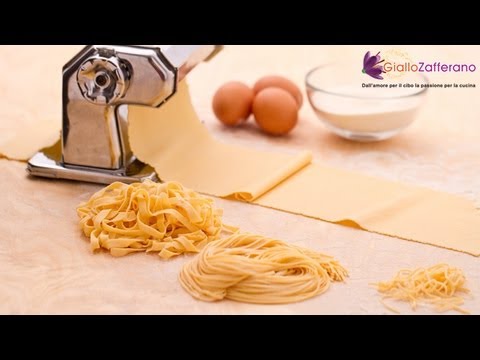Making fresh egg pasta
Making fresh egg pasta
Welcome to the GialloZafferano kitchen. I’m Sonia and today we’ll be making fresh egg pasta. With this recipe you can make hundreds of different types of pasta, from lasagne and ravioli to tortellini and tagliatelle. Let’s see what we’ll need.
3 ¼ cups (400 g) of all-purpose flour
A pinch of salt
4 eggs (weighing at least 2,5 oz/70 g each)
Let’s make our pasta.
Begin by making a pile of the flour on a worktop. Make a deep, wide indentation in the centre big enough to hold the eggs. Now pour the eggs into the centre, add a pinch of salt and after this break the yolks with a fork and beat them lightly. Be sure to keep the flour piled as to contain the eggs, and with the fork bring the flour little by little into the eggs. When the eggs have become more pasty, you can begin to knead it out with your hands. Now you can mix it with your fingers by pulling the flour little by little into the centre Now, as you can see the eggs are completely absorbed into the flour. I rubbed my hands together to get the last of the dough off and now it’s time to knead the dough vigorously for at least 15 minutes to achieve a very smooth dough. You can use a spatula to bring any little bits of pasta together to knead them back into the dough. This recipe is for enough pasta for 4 people. For each serving of pasta, you’ll need 1 egg and 1 cup of flour. We’re almost there. This is the movement you should use to knead your dough: Take the dough, fold it towards you, and knead it away from you. Turn the dough 90 degrees and do it again. Doing it this way will result in a smooth and uniform pasta. Now we need to let the dough rest. Take a bit of saran wrap, cover the dough completely, and let it rest for a half an hour in a cool place. This will render the dough elastic and easy to work with. Here we are. At this point we’re about halfway done. I say “almost done” because a good pasta should be about as thick as a piece of paper — yes, you heard correctly… a piece of paper. To do this, hold the dough with one hand and push the rolling pin out to elongate the dough. Then, turn 90 degrees and repeat. You should put pressure on the pin when moving away and release pressure when bringing it back. Another quarter turn and continue until you have the proper thickness. Here we are almost at our goal. I’ve stopped to show how you work it next. I’m at a thickness of about a millimeter but not yet as thin as a sheet of paper. The work from here on out is the same, roll it away from you, a quarter turn of the dough and continue until the dough is at the proper thickness. And here are just some of the hundreds of shapes you can make when you’ve formed your dough. Here are tagliolini, tagliatelle and pappardelle. I’ve made these by rolling the dough into a tube and cutting slices of the right size. For tagliolini, cut slices of 1/16 of an inch. I advise unrolling them right after cutting. For the tagliatelle, about a 1/4 inch will do, for pappardelle cut over a half an inch. Here are quadrucci which are perfect for cooking in a broth or soup. Layer strips of about 3/8 inch thick and cut little squares like this. Here we have farfalle. To make these, cut rectangles 1/8 inch by ¼ inch and pinch in the centre. If you’d like a zig-zag edge, make all vertical cuts with a zig-zag ravioli roller. For lasagne cut sheets at 5 ½ by 6 inches, however you can cut them according to the size of the dish you’ll be using. From lasagne sheets you can make cannelloni by putting a strip of filling about an inch from the edge and rolling like this. Then place them in your oven dish. What about the leftover bits of pasta? Maltagliati which means “poorly cut” in Italian — run a roller over the remaining pasta in any direction you want. Now you can choose whichever pasta you like, or whichever you need for your dish. From Sonia and GialloZafferano, see you next time.
This site contains product affiliate links. We may receive a commission if you make a purchase after clicking on one of these links.


